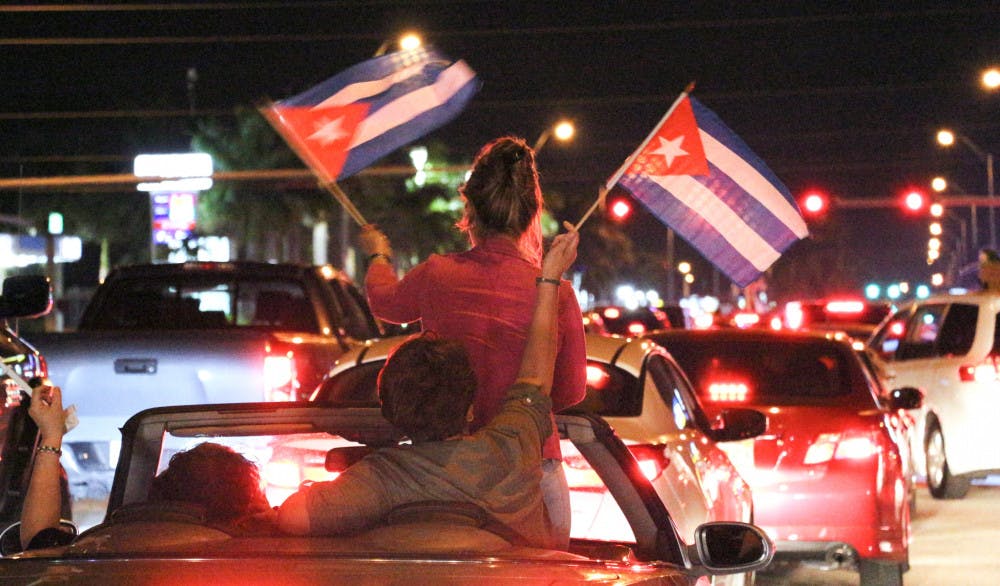Early Saturday morning, Pedro Luis Perez screamed until he lost his voice.
At about midnight, as the UF political science and history senior prepared to go to sleep, his phone lit up with a notification he had been waiting 10 years to receive: Fidel Castro is dead.
Raúl Castro, the brother of the former Cuban dictator, announced the news Friday night and declared nine days of national mourning.
But in Miami, where scores of Cubans have escaped from Castro’s communist reign, Perez joined thousands of his compatriots in celebration. He got out of bed and headed to Versailles Cuban Restaurant in Miami, where the chanting crowd took over two street blocks.
“The Wicked Witch of the Caribbean is dead,” one sign read.
Since Castro fell ill in 2006 with an undisclosed digestive illness, Perez, 21, said he knew the dictator’s death was not far away.
During his time leading Cuba, Castro was accused of human-rights violations including executing thousands of opponents, imprisoning tens of thousands of people and denying basic political freedoms.
Perez prayed to God to be in Miami when it happened so he could rejoice with his community.
His family came to the U.S. in 2004 after his mother won Cuba’s visa lottery, he said.
In Cuba, she was a dentist who struggled to provide for her family on the equivalent of $20 a month. She took a job cleaning bathrooms in a downtown Miami SunTrust Bank building, leaving behind more than a dozen relatives to give Perez a better life.
But over the weekend, he sang the Cuban National Anthem through the night with more than 1,000 others who shared his hope that all Cubans could soon have a better life.
With Castro’s death, Perez hopes to see a democratic Cuba.
“It’s the snake without the head,” he said.
• • •
After the announcement of Castro’s death, police patrolled the streets of Cuba, discouraging any demonstrations. When Perez called his grandmother in Cuba to tell her the news, state-run media didn’t report on it, and the country’s four television channels played movies, he said.
When he spoke of the celebration, his grandmother worried the government was monitoring their call.
To Lillian Guerra, a UF Cuban and Caribbean history professor, it’s a sign of a system of governance “set in stone.”
Since the transition of power to Raúl Castro in 2006, the Cuban military has awaited Castro’s death and prepared to maintain the communist party’s hold on the state, she said.
Military generals have already started laying plans to retain power in the coming decades, seemingly cementing the country’s fate.
“It’s going to surpass and survive Raúl’s death,” she said. “That has been set in stone.”
• • •
When she heard the news, Elizabeth Pantaleon thought of her grandfather — and the sleepless nights he spent awaiting Castro’s death.
After immigrating to Miami from Cuba in the 1960s, her grandfather would stay up late almost every night before he died in April, just to see if Castro was still alive.
Pantaleon, the vice president of the UF Cuban American Student Association, said she wishes he could have seen the day.
“It was a feeling of disbelief because (Castro has) always just been there since I was a child,” the 22-year-old UF international studies senior said.
She remembers hearing stories about the torture Castro’s government caused her great-grandfather, who was jailed and tortured for 30 years because he refused to give up his butcher shop.
The prison guards would randomly pull him from his cell, put a bag over his head and act as if they would shoot him. Though he was eventually released, the psychological toll would later lead to his death, she said.
Pantaleon’s family is not celebrating the death of a human being, she said, just the end of an era.
“It’s getting a sense of closure and justice,” she said. “This makes people feel lighter.”
• • •
When Stefanie Perez and her family heard about Castro’s death, she felt hope: hope for the end of tyranny, hope for the future.
At 10 months old, Perez left Cuba with her family for Fort Lauderdale after her mother won a visa in a lottery. Her parents left behind their own siblings and parents to give themselves a better life in a free land.
A friend’s phone call Saturday morning woke Perez to the news of Castro’s death. The UF applied kinesiology and physiology junior rushed to her parents.
While some traveled to Miami to celebrate, Perez and her parents followed along on TV.
Despite the sense of relief, Perez couldn’t shake the irony: While Cubans in the U.S. celebrated, those living in the country could not.
“I don’t think just because of his death we’re going to see an immediate response,” the 20-year-old said. “It’s a step forward for freedom, but it’s going to take a while.”
Two people wave Cuban flags as they are driven down Bird Road in Miami on Saturday night. People were either passing by or parking at La Carreta, a Cuban restaurant, to celebrate and cheer on the death of former Cuban leader Fidel Castro.






